DUBAI // Dubai International Airport is to be equipped with a public prosecution office to handle smuggling, illegal immigration and drugs cases, a senior government lawyer announced yesterday. Mohammed Ali Rustom, the chief prosecutor for Bur Dubai second district, also outlined procedures to deport travellers caught with small amounts of illegal drugs instead of prosecuting them in a court case.
Mr Rustom said the "fully functional" prosecution office would be provided by the Dubai Civil Aviation Authority at the International Airport's administration building. It would be the base for three full-time prosecutors, including an assistant chief prosecutor. "The decision to open the office was taken one month ago by Sheikh Ahmad bin Saeed Al Maktoum, president of the Dubai Civil Aviation Authority," Mr Rustom said.
DIA already has a prosecutor on duty 24 hours a day, seven days a week to ensure the speed and efficiency of procedures. Mr Rustom said the number of drug smuggling and possession cases originating from the airport had risen slightly in the first six months of 2008 compared with the same period last year. "This year we registered a total of 381 drug- related cases from January to June, compared to the same period last year when we only registered 336 cases."
However, Mr Rustom pointed out that this was not a major increase when compared to the dramatic rise in the number of visitors to Dubai in 2008 from the previous year. The assistant chief prosecutor for Bur Dubai second district, Mohammed al Nuaimi, recently said 98 per cent of drug cases originating at the airport involved narcotics, mostly heroin, swallowed in capsules by smugglers, a method he said was typically used by visitors from Asia.
"Most of these are individual initiatives, people who try to make Dubai a transit point for the transport of illegal narcotics, but there are no organised drug smuggling gangs involved," Mr Nuaimi said. He said although no formal guidelines were in place, visitors arrested at the airport with small quantities of drugs in their possession would often be sent straight home rather than face prosecution here.
"While there is no formal order to this effect, we follow the Dubai Attorney General's instructions in cases of possession of small quantities of drugs," he said. In such cases, "we recommend deportation to the technical office at the Public Prosecution Department which is the body that takes the decision". Under UAE law, anyone convicted of possession of drugs or drug abuse faces a four-year prison term.
Mr Rustom said decisions on whether travellers involved in minor possession should be referred to the courts or deported without proceedings would be taken on a case-by-case basis, adding that there were no fixed criteria. The Pakistani cricketer Mohammed Asef was detained at Dubai International Airport in June after customs inspectors discovered 0.24 grams of opium in his wallet. He was deported after two weeks in custody.
Mr Rustom said most minor possession cases usually involved people visiting the country for the first time. Only last week, the Dubai Criminal Court of First Instance heard three new cases of narcotics smuggling via Dubai International Airport. All three suspects were men, two of them African and the third Asian, and all had carried the drugs inside their bodies. A Nigerian man was attempting to smuggle 1,113.07 grams of cocaine stuffed inside 77 capsules, the court heard.
The man, detained on July 23, admitted he had swallowed the capsules and that he was told to deliver the drugs to a man he did not know at a hotel in Dubai. In another case, the court heard that a Ghanaian man was caught at the airport on Sept 4 with 715 grams of cocaine hidden inside 60 capsules concealed inside his body. The man told prosecutors he was asked by a compatriot in Ghana to deliver his consignment to an Italian man at a Dubai hotel.
Mr Rustom said the conviction rate for drug cases in general was close to 95 per cent. The total number of cases prosecuted by Bur Dubai second district, whose jurisdiction includes the airport, ports and Rifaa area of Dubai, was 3,452 in the first six months of this year, an increase of 218 cases compared to the same period in 2007. The total number of cases prosecuted from the airport actually decreased from 752 cases in the first six months of 2007, to 682 cases in the same period this year.
hbhatihish@thenational.ae






